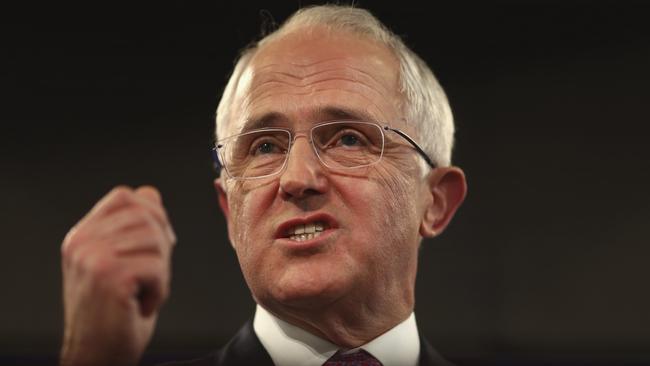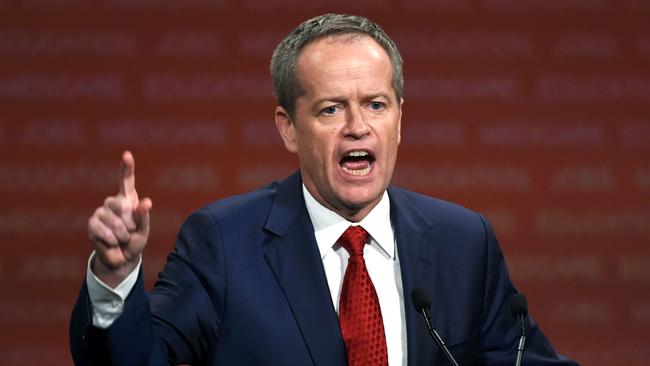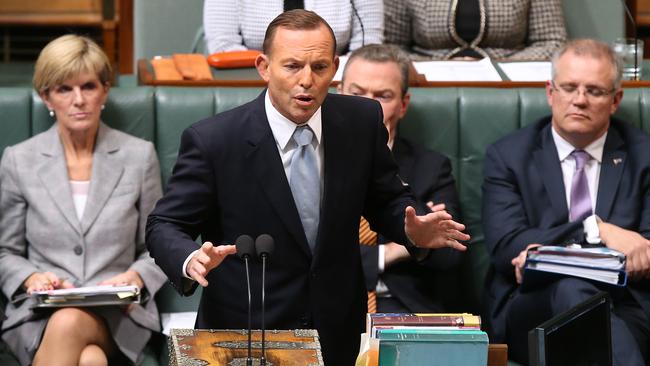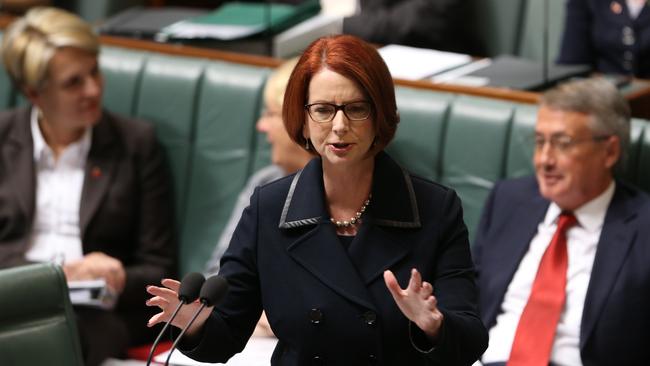Australia deserves a vote for stability
WE do not attempt to present Malcolm Turnbull as the perfect PM, but we believe he has the greater capacity to provide Australia with the strong government we so desperately need.

Opinion
Don't miss out on the headlines from Opinion. Followed categories will be added to My News.
- ROLLING COVERAGE: Polls tight, but govenment likely to win
- Election panic erupts within Labor
- ALP face last-minute Bendigo risk
- Bill Shorten 7.30interview: Leigh Sales loses patience over Medicare
AT its heart, this election is about trust. Tomorrow, Prime Minister Malcolm Turnbull and Opposition Leader Bill Shorten face the verdict of the people after one of the longest electoral campaigns in ​Australian ​political history.
As voters enter the cardboard polling booths to exercise their democratic right, they are justified to feel both sides of politics have let them down during what has been a drawn-out campaign littered with flawed policies, political spin, half truths, lies and damn lies.
Fuelling this voter cynicism are the personal records of both the Prime Minister and the alternative prime minister. Mr Turnbull cut down an elected prime minister in Tony Abbott and Mr Shorten has the prime ministerial scalps of Kevin Rudd and Julia Gillard dangling from his belt.
Still, Australians must decide who they most trust to lead the nation in turbulent global times over the coming three years. Or perhaps it’s a case of who they distrust least. In making their determination, front and centre will be management of the economy. With the nation’s interest bill on its debt costing taxpayers more than a billion dollars a month, spending must be reined in. Debt is projected to reach $356 billion in three years. Annual spending is more than $400 billion. The 2015-16 Budget deficit of $39.9 billion was the eighth in a row. Labor in its last years in government failed to deliver a single surplus.
The Coalition and Mr Shorten are committed to return to surplus but Labor does not have the same track record and in its DNA is an inclination to spend. Indeed, it has committed to significant extra spending in this campaign.
In managing the country’s books for almost a decade, both sides of politics have forgotten the maxim that it’s not their money. The money belongs to hardworking taxpayers and as such whoever is in government has a moral imperative to spend it wisely.
The Coalition and Labor are promising fiscal repair over the next decade. That Australia must learn to live within its means is a lesson Labor still fails to grasp.
The Coalition says it has a 10-year plan for growth and jobs, based on progressive cuts to company tax rates. There will be a benefit as companies reinvest.
“Jobs and growth” has been this self-proclaimed slogan-free Prime Minister’s three-word slogan. How great a boost this reinvestment will represent to the economy is arguable. Is it worth the $48 billion it will cost to cut the corporate tax rate from 30 per cent to 25 per cent over a decade?

Labor, in what can only be a deliberate misunderstanding of basic economics, says it will spend the $50 billion it will save by not implementing the tax cuts on health and education. There is no money saved. There would be only money spent by Labor.
Labor believes it will finish a 10-year cycle with the same economic position as the Coalition, but admits its spending across the four years of the forward estimates will be $16.5 billion greater than that by the Coalition.
Labor promises it will return the Budget to balance with a surplus of $1 billion by the mid 2020s.
This is the same year the Coalition says the Budget will be back in balance.
But Australians should be suspicious of these decade-long financial blueprints that promise surpluses on the never never while lacking political courage in the here and now.
A key factor in deciding who you trust is honesty. And on that score, Labor and Mr Shorten have been exposed. With the polls running on a knife edge for most of the campaign, Labor launched a cynical and dishonest scare campaign to swing voters. The vehicle was Medicare. Mr Shorten has peddled the claim that the Coalition was plotting to privatise Medicare. But he has no proof. It was built on a lie.
Mr Turnbull called it the great lie of the election. Where was Labor’s evidence, he asked? There was none.
What makes it worse is that Mr Shorten persists with an untruth as Labor’s campaigners work the phones to frighten older Australians into giving them their vote.
If the Australian people did not believe Mr Turnbull when he rejected the most outrageous fear campaign used in any election, they should be more inclined to believe the president of the Australian Medical Association, who backed Labor promises to restore bulk-billing to keep down doctors’ costs and those of their patients. He found no indication the Coalition intended to sell Medicare.
Today, the Herald Sun publishes the latest Galaxy poll showing the Coalition tightening its grip on power, taking a 51-49 per cent two-party preferred lead into tomorrow.
It indicates that Mr Shorten’s chances of gaining government appear to be fading.
A vote for Labor is at best a leap into the unknown and at worst jumping back into the chaos of the Rudd-Gillard-Rudd years.
With the world reeling from the shock Brexit vote and a multitude of other economic headwinds, Labor represents a massive risk.
The Coalition is appealing to electors with what it says is a more considered and effective path to economic success. The company tax cuts will breathe life into the economy. Business will be encouraged to invest and jobs and growth will follow.
The Coalition represents a safer pair of hands, argues Mr Turnbull, although he risks being thought of as arrogant in predicting a Coalition victory. Always confident, he is now almost suave, the self-made multi-millionaire who prefers to live in his harbourside mansion rather than Sydney’s Kirribilli House.
Mr Turnbull warns of too many imponderables under Labor, which has seen its prospects unravel at the business end of an election campaign. Even if undecided voters swing against the Coalition, it is unlikely it will be enough for Labor to secure the extra 21 seats it needs to be elected.
IN Victoria, a state-specific issue has broken the containment lines. The raging CFA dispute over the DanielAndrews-backed union takeover of the volunteer organisation threatens to engulf Labor.
Yes, it is a state issue. But it is also a window into the relationship between Labor and the union movement. Premier Andrews’s push for an agreement that gives the hardline United Firefighters Union veto rights over the management decisions of the Country Fire Authority and its 60,000 volunteers is spooking voters.
It has quickly become the most divisive element of a bitter campaign as thousands of CFA volunteers face off against paid union firefighters at polling booths tomorrow.
About 10,000 volunteers are expected to turn out to show their anger at the Labor-sponsored takeover.
Angry and aggressive United Firefighters Union members have snatched Herald Sun BACK THE CFA stickers from newsagents.
A former CFA volunteer who spoke up was allegedly punched in the face.
Premier Andrews has displayed his Left-wing union obsession in pushing the UFU’s veto demands through Cabinet, He has sacked the CFA board and forced the resignations of emergency services minister Jane Garrett, CFA chief executive Lucinda Nolan and CFA chief fire officer Joe Buffone, who opposed the pro-union deal.
The Premier’s unprecedented and unwarranted actions have damaged Mr Shorten’s standing in key marginal electorates in Victoria where volunteers have made their feelings known.

A Herald Sun poll showed more than 40 per cent of voters in key marginal seats, including Dunkley and McEwen, say they are less likely to vote for Mr Shorten because of this ALP-induced crisis.
Mr Shorten still tries to pass off the power grab as a state issue, whereas Mr Turnbull promises to introduce retrospective legislation to reverse a takeover if he retains government tomorrow.
The CFA takeover has achieved critical mass. Herald Sun polling indicates it is a game changer in how many Victorians will vote.
As always, the economy, health and education occupy the thoughts of most Australians and will play a significant part in this election.
Immigration is another key issue. Australians are generous by nature, but don’t want a return to the years under the Rudd and Gillard governments when 50,000 asylum seekers were brought here by people smugglers. Some 1200 people drowned on Labor’s watch until Mr Abbott and the Coalition won government on a pledge to turn back the boats.
It worked. The boats stopped coming. Asylum seekers no longer drowned at sea. But the Abbott government fell from favour with what was seen as a disastrous Budget in 2014. It sowed the seeds of Mr Abbott’s demise as Mr Turnbull and his supporters relentlessly counted the numbers until they were sure of toppling him. Politicians, as always, were swayed by the prospect of losing their seats.
Similarly, Mr Shorten played a central role in bringing down Mr Rudd in favour of Julia Gillard and then brought about Ms Gillard’s demise in favour of a resurrected Mr Rudd.
Political assassination leaves an uneasy feeling in an electorate that has always proved itself to be more honest in its beliefs than those who compete for its vote. Neither Mr Turnbull nor Mr Shorten have raised the issue of betrayal. Each has bloody hands, no matter how they might seek to wash away their actions.
If Mr Turnbull wins tomorrow, he will point to necessity. The polls showed Mr Abbott’s government would have been defeated. Mr Shorten has voiced his regrets over his part in bringing down two prime ministers. If he is defeated tomorrow, he will have to fight to keep his job from Labor rivals.
Tomorrow also presents another test for voters as they contend with a new Senate voting system, made necessary because of preference manipulation among minor parties and their candidates; some of whom were elected on tiny percentages of the primary vote. The Nick Xenophon Team is worrying the major parties in South Australia, particularly the Coalition.
The Greens continue to emerge as the third force in federal politics with party leader Richard Di Natale saying the Greens could win eight seats in the House of Representatives over the next decade. But voters should not trust them. They are economic vandals and a danger to the economy.
The senator’s statement that the Greens could serve in a coalition with Labor has allowed Mr Turnbull to warn against a protest vote that could produce a hung parliament and a return of dysfunctional government under a Labor-Greens alliance.
This possibility of a coalition with the Greens in a hung parliament is dismissed by Mr Shorten, but who really believes he would deny himself the prospect of power if that opportunity were to present itself?
Labor, always inclined to overspend, would be presented with the Greens’ latest wish list, which requires new spending of $123 billion over the next four years. That is no less than financial vandalism.
In the Senate, Australia cannot be allowed to be held hostage to a grab bag of independents and it is critical for economic certainty that a workable Senate is elected tomorrow. The unworkable Senate was one of the reasons the Prime Minister called a double-dissolution election. The other justification from the PM for a rare double-d election was the necessity to reintroduce the ABCC, the union watchdog. Oddly enough, Mr Turnbull has not prosecuted this ABCC argument during the campaign with anywhere near the passion and enthusiasm it deserved.
More than ever in modern politics, the question is one of trust as well as policy.
A vote for Labor will mean legislation to approve same-sex marriage within 100 days.
If Mr Turnbull wins, there will be a plebiscite on the issue. If the plebiscite is carried, Mr Turnbull says he will enshrine it in law.
THERE are the major issues of superannuation and negative gearing to further confound voters. This has been a significant negative for the Coalition under Mr Turnbull.
People rightly resent changes to their preparations for retirement, often at a considerable advantage to government.
Self-funded retirement is no longer the attractive investment it was. The Australian people must find their way through scrub that has become impenetrable bush to arrive at a decision tomorrow.
Mr Turnbull was welcomed when he overthrew Mr Abbott. The new Prime Minister mapped out a vision for this country and an economic blueprint. He hit the right notes. But he has failed to deliver on his early rhetoric.

Far from being the strong leader he promised to be, Mr Turnbull shrank into a diminished and dithering leader, seemingly unsure of himself.
A 15 per cent GST was floated and dropped. State income tax was floated and dropped. The federal Budget contained no significant spending cuts.
People lost their early enthusiasm. There was little to suggest the exciting times Mr Turnbull promised.
But voters will be wary of giving the revolving door of prime ministers another spin. Mr Shorten, if elected, would be our sixth prime minister since John Howard, Australia’s second-longest prime minister behind Sir Robert Menzies. Sir Robert served 16 years, Mr Howard 12.
At the end of this campaign, brought on by the double dissolution, that has turned it into the longest for nearly 50 years, there is a sense that Mr Turnbull has not only found his voice, but a strength Mr Shorten has been unable to project as he is buffeted by events.
Some have been beyond his control. Others he has walked into with eyes wide shut. His acceptance of a dishonest Medicare campaign has wrapped this lie around him. His union allegiance is a stone around his neck to many voters. Do people want a prime minister who says he would run the country as he would run a union?
That can only mean more cave-ins to union demands, more costs to industry and an unsustainable burden on the economy.
Australians deserve stability. A vote for Labor promises uncertainty, a vote for the Greens only a greater unknown.
The Herald Sun does not attempt to present Mr Turnbull as the perfect prime minister, but we believe he has the greater capacity to provide Australia with the strong government we so desperately need.
Mr Shorten has campaigned hard, but Labor needs to spend at least another three years on the opposition benches to get its policy and cultural house in order.
The Herald Sun believes Australia’s future is best served with a vote for Mr Turnbull and the re-election of the Coalition.
More politics:
Email reveals Dan’s secret CFA side deal


